Group Railway Projects
Nippon Koei Group Railway Projects
A look at some of Nippon Koei’s key railway projects.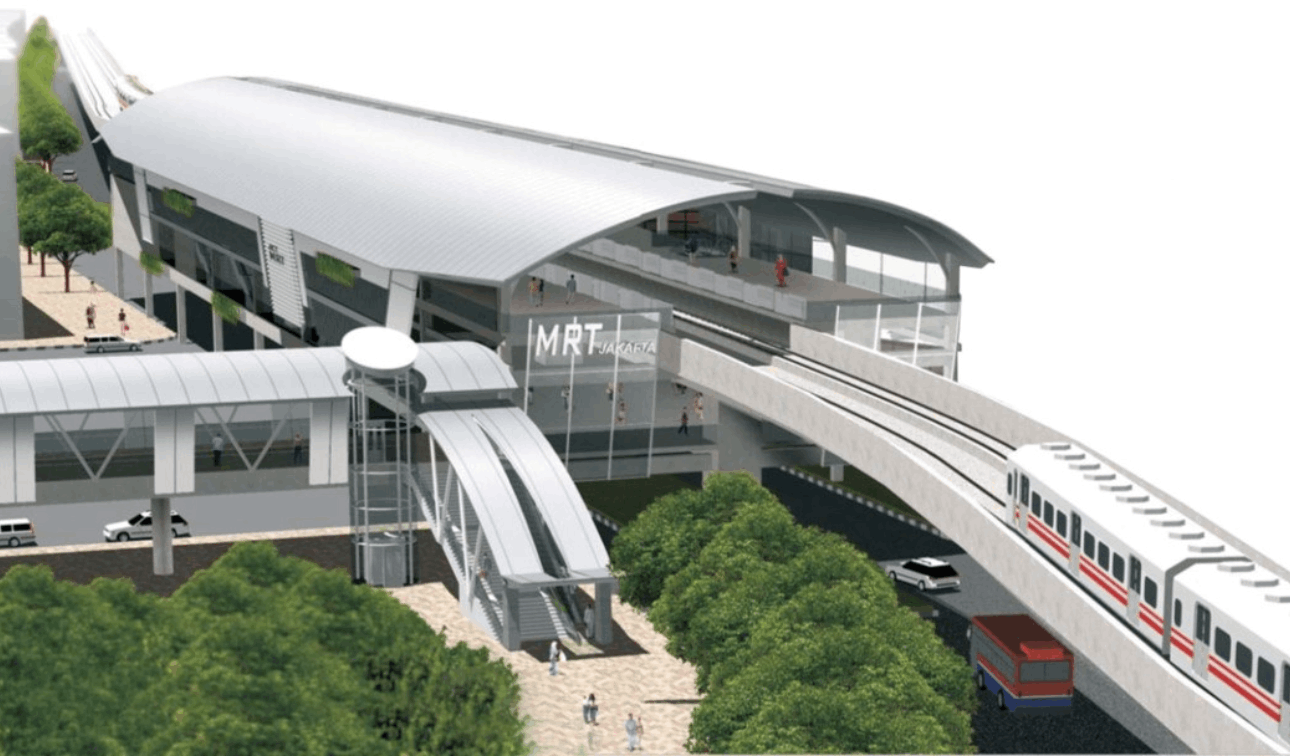
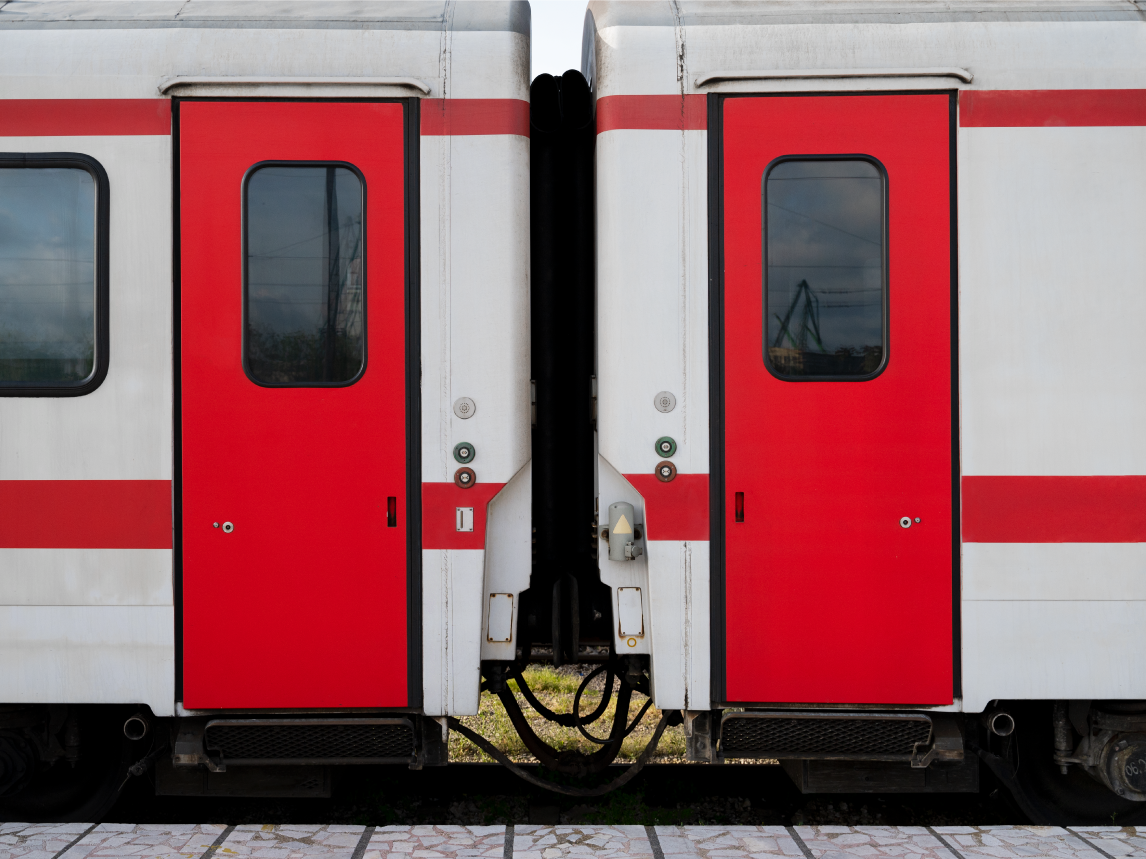
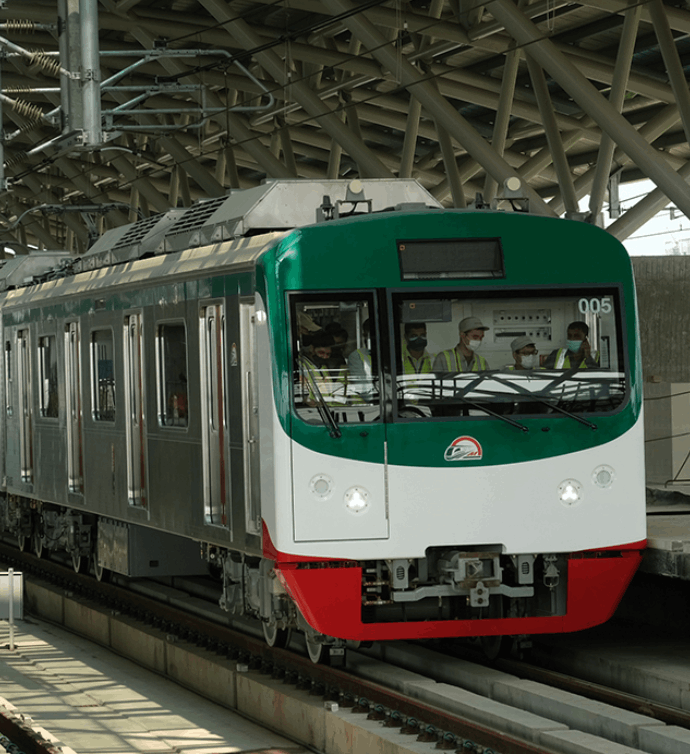
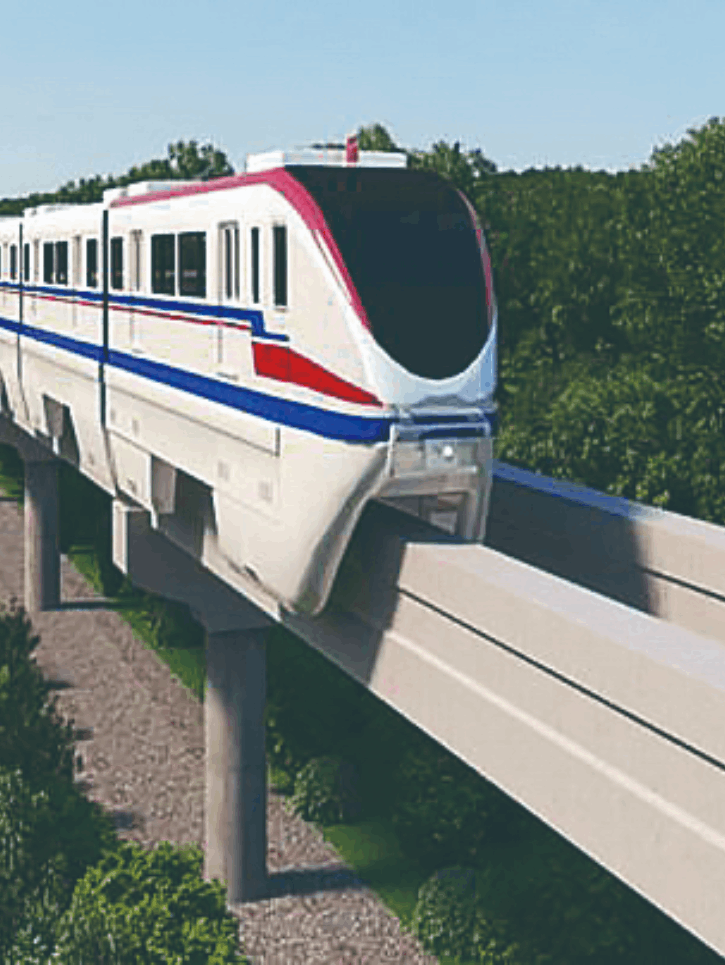
Project name:
Jakarta Mass Rapid Transit System Project. (North–South Line)
Project description:
The Jakarta Mass Rapid Transit (MRT) System Project. (North–South Line) was a groundbreaking initiative with the primary aim of revolutionising the city's transportation infrastructure. Spanning a total length of 14.5km, this project encompassed the Depot Facilities in Lebak Bulus, sprawling across 2.2 hectares, the MRT Underground section, measuring 4km with four strategically located stations, and the MRT Elevated section, extending over 10.5km with eight well-placed stations. This project aimed to provide efficient, eco-friendly transportation solutions to alleviate traffic congestion and improve public transportation infrastructure.
Our role:
We offered a comprehensive range of services across two key phases. In Phase 1, we offered critical services such as Feasibility Study, Basic Design, Tender Assistance, and Operation and Maintenance Consulting Services. These initial steps were vital in setting the foundation for the project's success, ensuring that it is well-planned, economically viable, and operates efficiently over the long term. Moving into Phase 2, we provide Construction Supervision services, overseeing the implementation and execution of the project, ensuring that it aligns with the approved design and standards.
Project name:
Ahmadabad Mumbai High Speed Rail.
Project description:
This project spans 506km, connecting 12 key stations and passes through two Indian states, namely Maharashtra (covering 156km) and Gujarat (encompassing 351km), along with the Union Territory of Dadra & Nagar Haveli. This high-speed rail system boasts a maximum design speed of 350km per hour, while the maximum operating speed is set at 320km per hour. This advancement in transportation promises to dramatically reduce journey times, with a mere 2-hour commute for limited stops and a slightly longer 2.5-hour journey for those making stops at various stations along the route. This project is set to revolutionise travel between these two major cities, significantly cutting down travel times compared to the existing 7 to 8-hour train journeys.
Our role:
For this project, we played a key role in the development of detailed designs, ensuring that every aspect of the project was meticulously planned and executed to the highest standards. Additionally, we were responsible for the preparation of tender documents, and construction supervision, where we oversaw the execution of the project, ensuring that it aligned with the approved plans and adhered to safety and quality standards.
Project name:
Dhaka MRT Line No.6.
Project description:
The Dhaka Mass Rapid Transit (MRT) Line No. 6 Project aimed to address the growing transportation needs of the city. Spanning a total length of 20.1km, this project encompassed the establishment of a comprehensive public transportation network. With 16 strategically located stations, this MRT line is set to improve the way people move within Dhaka, providing efficient, eco-friendly, and convenient options for commuters.
Our role:
In this project, we worked on providing detailed designs to ensure a well-structured project. Additionally, we assisted in tender assistance to aid in the procurement process, helping in the selection of contractors and suppliers. We also played a key role in construction supervision, where our team of experts oversaw and managed the construction phase to maintain high-quality standards and compliance. Lastly, we acted as Advisory Services for Operation and Maintenance, ensuring that the project's long-term sustainability and efficient functioning were upheld.
Project name:
Panama Metro Line 3.
Project description:
The Panama Metro Line 3 project implemented is a state-of-the-art monorail system spanning the east-west corridor, providing crucial connectivity across the Panama Canal via the 4th Panama Bridge. This track consists of an all-elevated infrastructure covering a distance of 25.8km and features a total of 14 strategically located stations. The Line 3 project represents a significant step in Panama's transportation infrastructure, promising to enhance mobility and facilitate efficient travel across this vital region.
Our role:
Throughout this project, we provided detailed designs which involved the meticulous planning and blueprinting of the project to ensure its efficiency and functionality. To further aid in the development of this metro line, we worked on preparing tender documents which are essential for the procurement of materials, equipment, and services. Lastly, we also played a key role in construction supervision, where our team of experts oversaw and managed the construction phase to maintain high-quality standards and compliance.
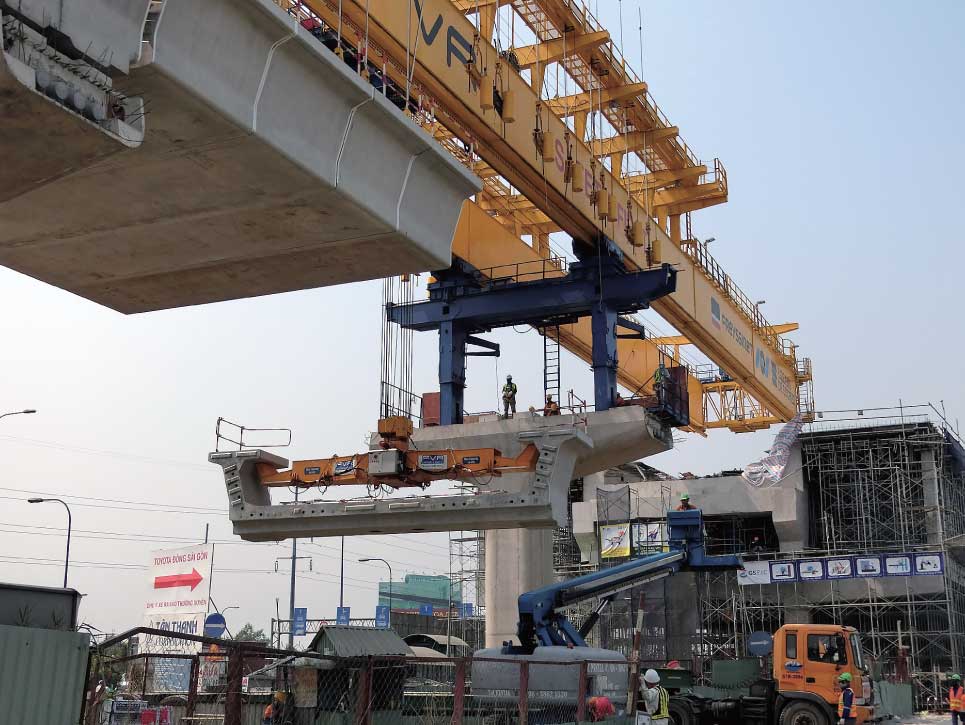
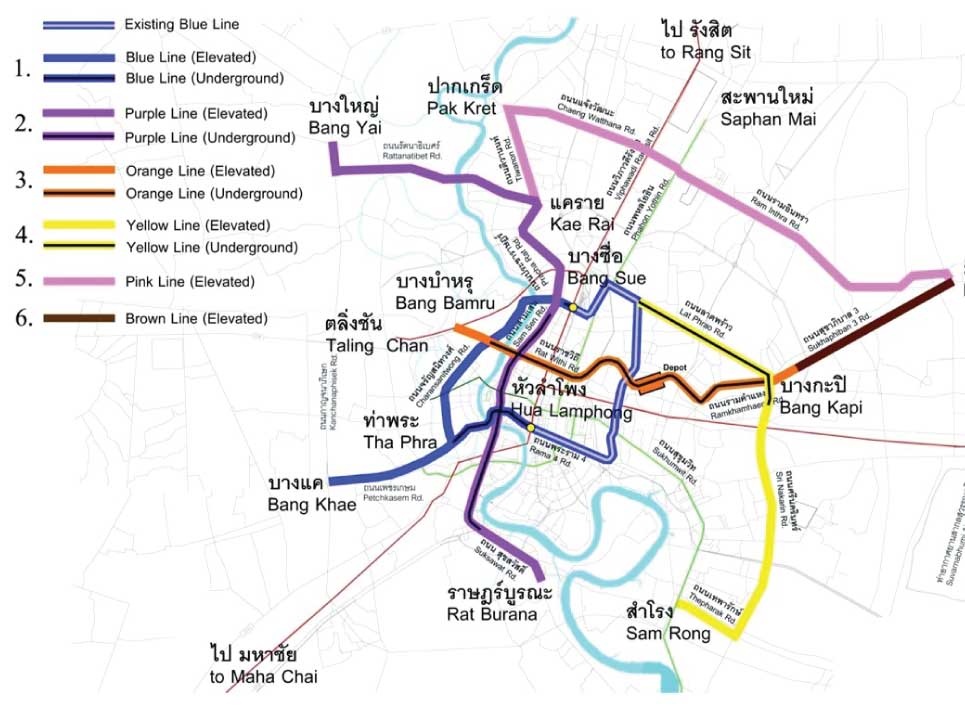
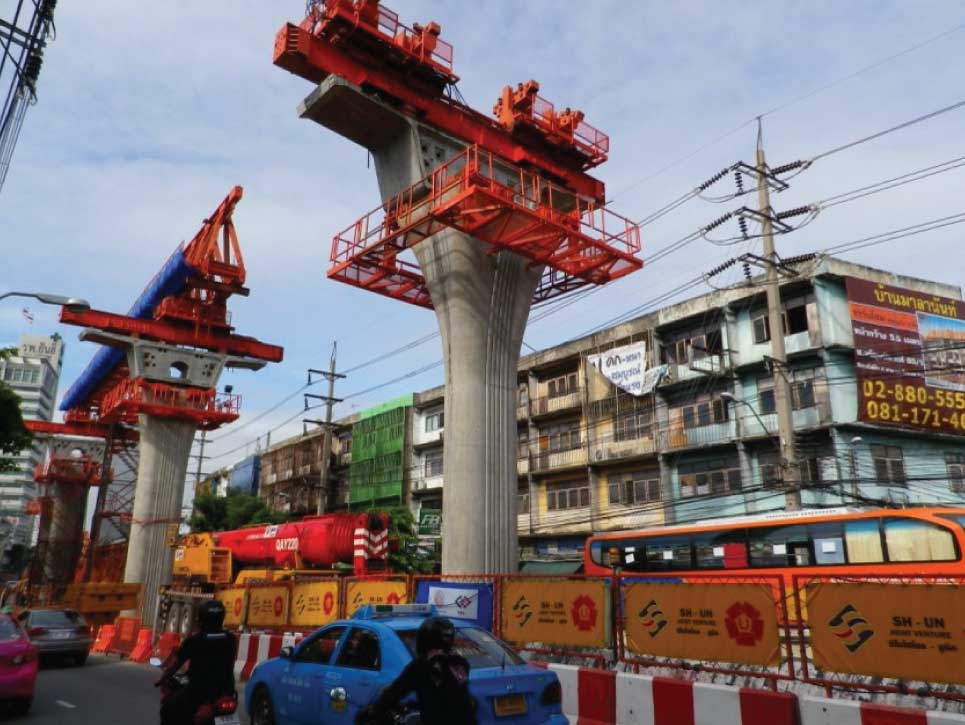
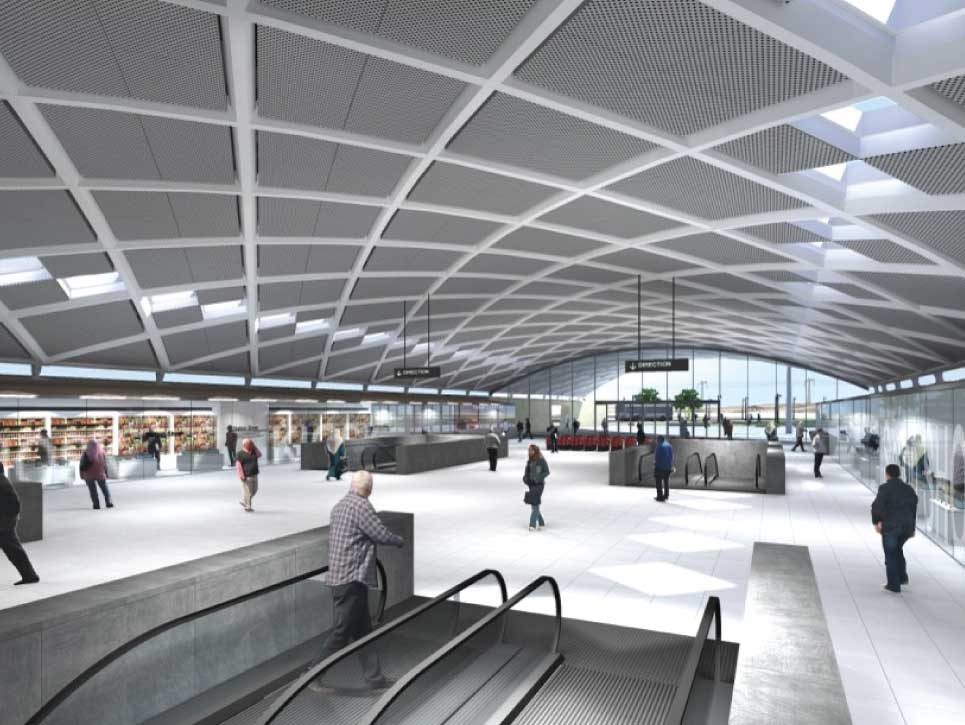
Project name:
Vietnam - Ho Chi Minh City Urban Railway Construction Project, Ben Thanh - Suoi Tien Section (Line 1)
Project description:
The Mass Rapid Transit (MRT) Project in Vietnam is set in the economic hub of Ho Chi Minh City, spanning 19.7km. The project comprises a 2.6km underground section housing 3 stations, and an elevated section spanning 17.1km with eleven stations. This initiative marks a significant stride in enhancing transportation infrastructure within the bustling metropolitan area, aiming to provide efficient and convenient connectivity for the residents and contribute to the city's economic development.
Our role:
During the project, Nippon Koei provided a comprehensive range of services, including basic design to lay the groundwork, tender assistance to facilitate the procurement process, and construction supervision to ensure seamless project execution. Additionally, Nippon Koei provided advisory service for operation and maintenance to share valuable insights to optimise long-term functionality and sustainability. These services collectively contributed to the success and efficiency of the project, covering various stages from initial design to ongoing operational support.
Project name:
Thailand – Bangkok 3 Lines (Yellow, Brown and Pink Lines), Mass Transit Projects (Pink Line: Monorail)
Project description:
The project features 3 main lines: the Yellow Line with a total length of 30.4km and 23 stations, costing US$1,500 million; the Brown Line covering 20.5km with 21 stations; and the Pink Line, a monorail spanning 35.5km with 30 stations, and a project cost of US$1,600 million.
Our role:
Nippon Koei provided a comprehensive feasibility study to assess the viability of the project. This involved a detailed analysis of potential challenges, risks, and opportunities. Following the feasibility study, a preliminary design phase was initiated to outline the project's initial framework and specifications. This step laid the foundation for subsequent stages, ensuring that the project was well-planned and aligned with the desired goals.
Project name:
Thailand – MRT Blue Line Extension Project
Project description:
The project spans a total length of 27km, with 4 stations located in the underground section and 15 stations in the elevated section. The underground section contributes to the overall connectivity, providing essential transit points across its 4 stations, while the elevated section enhances accessibility with its 15 strategically placed stations.
Our role:
Throughout the project, Nippon Koei provided a design review to ensure that the project adheres to the highest standards of design excellence, while construction supervision ensures smooth and efficient project execution. Additionally, we offered technology transfer services to enable clients to seamlessly integrate and implement the latest technological advancements into the projects.
Project name:
Egypt – Greater Cairo Metro Line No.4
Project description:
The project encompasses a total length of 40.7km, divided into 2 phases. Phase 1 spans 17.2km and includes 16 stations, while Phase 2 covers 23.5km with 19 stations. This Metro Line aims to enhance connectivity and accessibility across designated areas, facilitating efficient and convenient travel for communities.
Our role:
Nippon Koei offered a range of services for this project, starting with a comprehensive feasibility study to assess the viability of the project. Following this, a basic design phase was initiated to outline the foundational aspects of the project. Once Nippon Koei received approved plans and project details, a detailed design stage commenced, delving into the specifications and finer details of the project. Nippon Koei also prepared tender documents which were crucial for soliciting bids and selecting contractors.
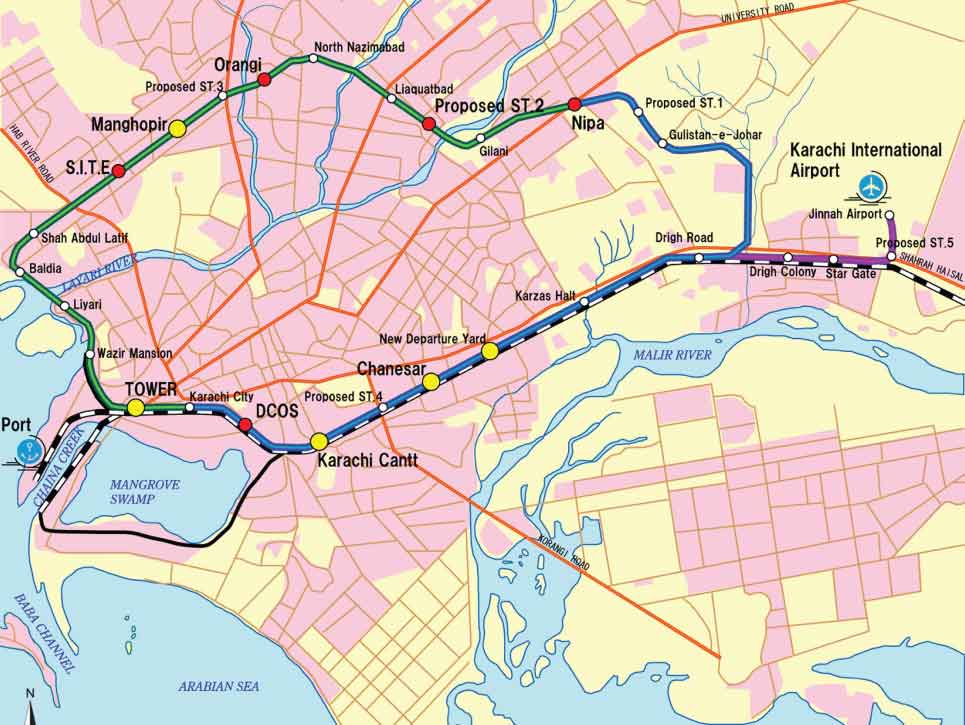
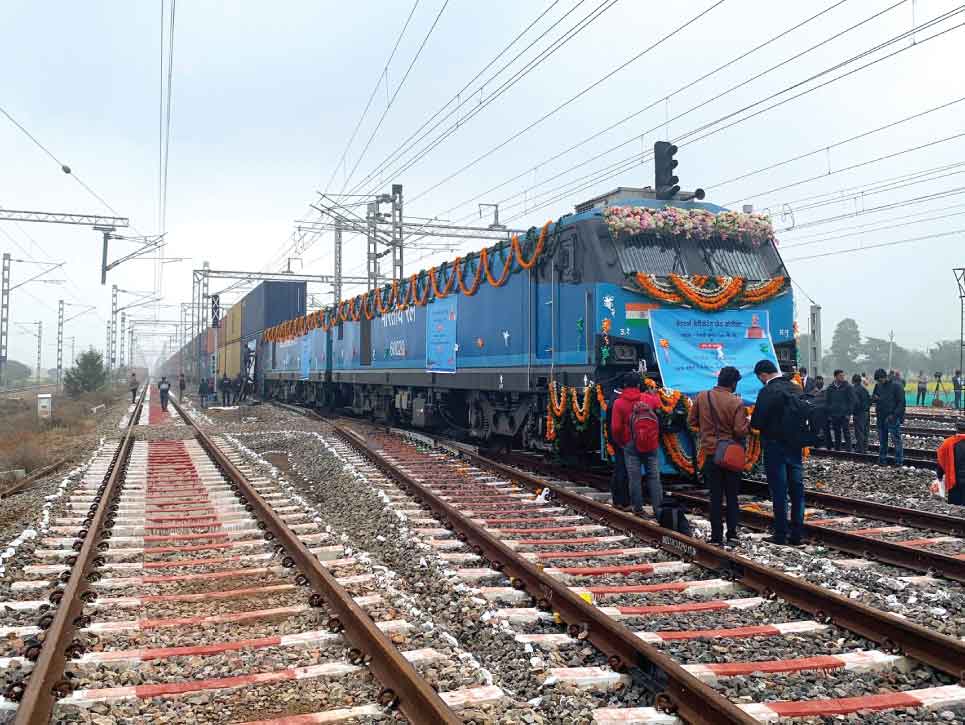
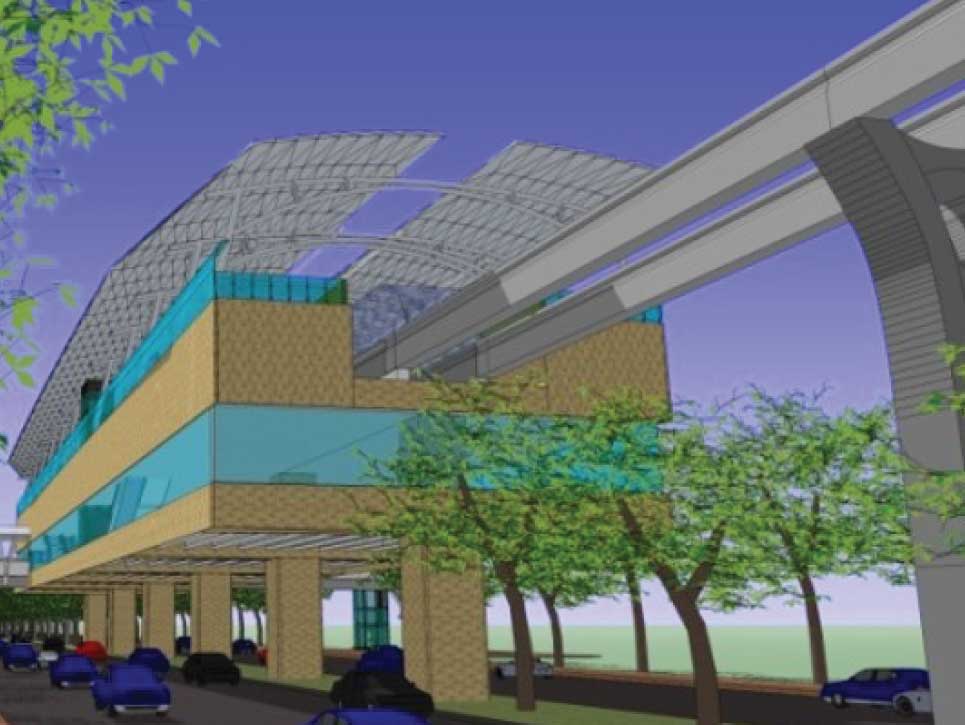
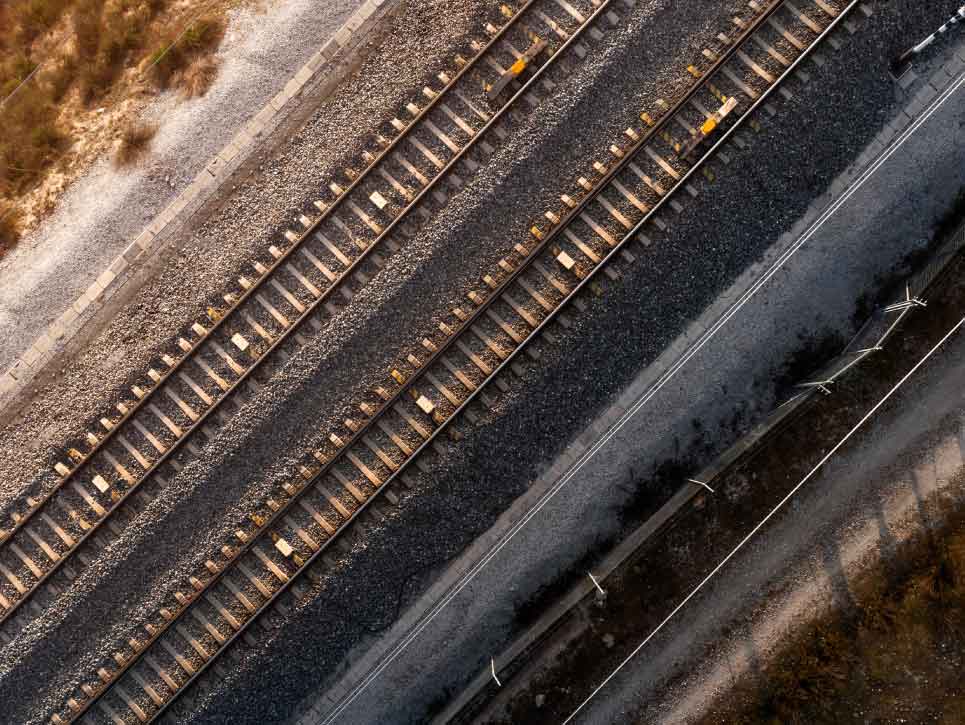
Project name:
Pakistan – Karachi Circular Railway Revitalisation
Project description:
This project involved the revitalisation of a single-track passenger railway that was abandoned in 1999. The total length of the railway is 43.12km, with 24 stations along its route. The railway comprises different sections, including 16.33km at-grade with 11 stations, 21.51km elevated with 11 stations, 3.93km underground with 2 stations, and 1.35km on bridges with no stations. The initiative aims to bring back life to the previously abandoned railway and enhance transportation connectivity in the area.
Our role:
Nippon Koei worked on the master planning and feasibility study for this project. During the master planning stage, Nippon Koei’s team created comprehensive, strategic blueprints that guided the development of this project by analysing land use, infrastructure, and environmental considerations. Additionally, Nippon Koei worked on a feasibility study to gather insights on the viability and potential success of the project, evaluating economic, technical, and operational aspects. Through these services, Nippon Koei provided the Japan International Cooperation Agency (JICA) and Ministry of Economy, Trade and Industry, Japan (METI) with informed insights and well-defined roadmaps, ensuring the successful execution of the railway revitalisation project.
Project name:
India - Dedicated Freight Corridor 1,500km
Project description:
The project spans a total length of 46km, with an elevated section covering 45.4km and an underground section extending for 0.6km. The monorail includes a network of 53 stations strategically positioned along the route.
Our role:
Nippon Koei conducted a feasibility study to examine the viability and potential success of this project, taking into account various factors such as economic, technical, and operational considerations. Subsequently, Nippon Koei offered engineering design services that involved the development of detailed plans and specifications, ensuring the seamless execution of the project.
Project name:
Urban Transport Development Project in Sao Paulo (Monorail)
Project description:
The project encompasses a total length of 1,474km, divided into 2 phases. Phase I spans 922km and covers the route from Rewari to Vadodara, while Phase II extends over 552km, connecting Dadri to Rewari and Vadodara to Mumbai. The key feature of this project is the implementation of double-stacked container freight train operations, enhancing the efficiency and capacity of cargo transportation along this extensive railway network.
Our role:
Nippon Koei was engaged to conduct a feasibility study to assess the success of the project by studying various factors such as the economic situation, the technical advancements, and operational considerations. With this, Nippon Koei provided a preliminary design and tender document preparation. Additionally, Nippon Koei facilitated a technology transfer to ensure access to the latest standards of technology, while maintaining efficient project management.
Project name:
Mongolia – Rehabilitation of the Railway 1,580km
Project description:
This project has a total length of 1,580km and aims to enhance connectivity between strategic coal and copper mines and international markets. This railway seeks to facilitate efficient transportation of these valuable resources, contributing to the seamless integration of these mines into global trade networks.
Our role:
In this project, we were responsible for a wide range of critical tasks and consultations. We provided consultancy for the design of specialised interfaces tailored to Simis IS electronic interlocking components, notably Level Crossings (Simis LC), coded track circuits, and various Block systems. Additionally, we were responsible for designing specific interfaces between Simis IS interlocking and the ETCS L2 system, ensuring seamless integration between these crucial railway technologies. Our team conducted a comprehensive impact analysis of the new Simis IS system, offering insights into its broader implications. We also actively engaged in the resolution of Trouble Reports and change Requests, addressing issues and adapting to evolving requirements. Finally, we participated in technical meetings organised by Siemens Switzerland, collaborating closely with partners from Hungarian Railways to facilitate effective communication and cooperation throughout the project.

Project name:
Cambodia – Rehabilitation of the Railway
Project description:
With a total length of 650km, this project involves the rehabilitation of 2 existing lines along with the reconstruction of a missing link. The rehabilitation process aims to enhance the condition and functionality of the 2 lines, while the reconstruction focuses on bridging a gap in the network, ensuring a seamless and connected transportation system.
Our role:
Nippon Koei worked on a preliminary design, where initial concepts were developed, while also working on the tender document preparation that involved the creation of comprehensive documents for project bids. After this stage, Nippon Koei conducted a detailed design review and provided construction supervision to oversee the implementation phase. Lastly, Nippon Koei facilitated a technology transfer to ensure seamless sharing of technological knowledge and expertise.













Project name:
Jakarta Mass Rapid Transit System Project. (North–South Line)
Project description:
The Jakarta Mass Rapid Transit (MRT) System Project. (North–South Line) was a groundbreaking initiative with the primary aim of revolutionising the city's transportation infrastructure. Spanning a total length of 14.5km, this project encompassed the Depot Facilities in Lebak Bulus, sprawling across 2.2 hectares, the MRT Underground section, measuring 4km with four strategically located stations, and the MRT Elevated section, extending over 10.5km with eight well-placed stations. This project aimed to provide efficient, eco-friendly transportation solutions to alleviate traffic congestion and improve public transportation infrastructure.
Our role:
We offered a comprehensive range of services across two key phases. In Phase 1, we offered critical services such as Feasibility Study, Basic Design, Tender Assistance, and Operation and Maintenance Consulting Services. These initial steps were vital in setting the foundation for the project's success, ensuring that it is well-planned, economically viable, and operates efficiently over the long term. Moving into Phase 2, we provide Construction Supervision services, overseeing the implementation and execution of the project, ensuring that it aligns with the approved design and standards.
Project name:
Ahmadabad Mumbai High Speed Rail.
Project description:
This project spans 506km, connecting 12 key stations and passes through two Indian states, namely Maharashtra (covering 156km) and Gujarat (encompassing 351km), along with the Union Territory of Dadra & Nagar Haveli. This high-speed rail system boasts a maximum design speed of 350km per hour, while the maximum operating speed is set at 320km per hour. This advancement in transportation promises to dramatically reduce journey times, with a mere 2-hour commute for limited stops and a slightly longer 2.5-hour journey for those making stops at various stations along the route. This project is set to revolutionise travel between these two major cities, significantly cutting down travel times compared to the existing 7 to 8-hour train journeys.
Our role:
For this project, we played a key role in the development of detailed designs, ensuring that every aspect of the project was meticulously planned and executed to the highest standards. Additionally, we were responsible for the preparation of tender documents, and construction supervision, where we oversaw the execution of the project, ensuring that it aligned with the approved plans and adhered to safety and quality standards.
Project name:
Dhaka MRT Line No.6.
Project description:
The Dhaka Mass Rapid Transit (MRT) Line No. 6 Project aimed to address the growing transportation needs of the city. Spanning a total length of 20.1km, this project encompassed the establishment of a comprehensive public transportation network. With 16 strategically located stations, this MRT line is set to improve the way people move within Dhaka, providing efficient, eco-friendly, and convenient options for commuters.
Our role:
In this project, we worked on providing detailed designs to ensure a well-structured project. Additionally, we assisted in tender assistance to aid in the procurement process, helping in the selection of contractors and suppliers. We also played a key role in construction supervision, where our team of experts oversaw and managed the construction phase to maintain high-quality standards and compliance. Lastly, we acted as Advisory Services for Operation and Maintenance, ensuring that the project's long-term sustainability and efficient functioning were upheld.
Project name:
Panama Metro Line 3.
Project description:
The Panama Metro Line 3 project implemented is a state-of-the-art monorail system spanning the east-west corridor, providing crucial connectivity across the Panama Canal via the 4th Panama Bridge. This track consists of an all-elevated infrastructure covering a distance of 25.8km and features a total of 14 strategically located stations. The Line 3 project represents a significant step in Panama's transportation infrastructure, promising to enhance mobility and facilitate efficient travel across this vital region.
Our role:
Throughout this project, we provided detailed designs which involved the meticulous planning and blueprinting of the project to ensure its efficiency and functionality. To further aid in the development of this metro line, we worked on preparing tender documents which are essential for the procurement of materials, equipment, and services. Lastly, we also played a key role in construction supervision, where our team of experts oversaw and managed the construction phase to maintain high-quality standards and compliance.
Project name:
Vietnam - Ho Chi Minh City Urban Railway Construction Project, Ben Thanh - Suoi Tien Section (Line 1)
Project description:
The Mass Rapid Transit (MRT) Project in Vietnam is set in the economic hub of Ho Chi Minh City, spanning 19.7km. The project comprises a 2.6km underground section housing 3 stations, and an elevated section spanning 17.1km with eleven stations. This initiative marks a significant stride in enhancing transportation infrastructure within the bustling metropolitan area, aiming to provide efficient and convenient connectivity for the residents and contribute to the city's economic development.
Our role:
During the project, Nippon Koei provided a comprehensive range of services, including basic design to lay the groundwork, tender assistance to facilitate the procurement process, and construction supervision to ensure seamless project execution. Additionally, Nippon Koei provided advisory service for operation and maintenance to share valuable insights to optimise long-term functionality and sustainability. These services collectively contributed to the success and efficiency of the project, covering various stages from initial design to ongoing operational support.
Project name:
Thailand – Bangkok 3 Lines (Yellow, Brown and Pink Lines), Mass Transit Projects (Pink Line: Monorail)
Project description:
The project features 3 main lines: the Yellow Line with a total length of 30.4km and 23 stations, costing US$1,500 million; the Brown Line covering 20.5km with 21 stations; and the Pink Line, a monorail spanning 35.5km with 30 stations, and a project cost of US$1,600 million.
Our role:
Nippon Koei provided a comprehensive feasibility study to assess the viability of the project. This involved a detailed analysis of potential challenges, risks, and opportunities. Following the feasibility study, a preliminary design phase was initiated to outline the project's initial framework and specifications. This step laid the foundation for subsequent stages, ensuring that the project was well-planned and aligned with the desired goals.
Project name:
Thailand – MRT Blue Line Extension Project
Project description:
The project spans a total length of 27km, with 4 stations located in the underground section and 15 stations in the elevated section. The underground section contributes to the overall connectivity, providing essential transit points across its 4 stations, while the elevated section enhances accessibility with its 15 strategically placed stations.
Our role:
Throughout the project, Nippon Koei provided a design review to ensure that the project adheres to the highest standards of design excellence, while construction supervision ensures smooth and efficient project execution. Additionally, we offered technology transfer services to enable clients to seamlessly integrate and implement the latest technological advancements into the projects.
Project name:
Egypt – Greater Cairo Metro Line No.4
Project description:
The project encompasses a total length of 40.7km, divided into 2 phases. Phase 1 spans 17.2km and includes 16 stations, while Phase 2 covers 23.5km with 19 stations. This Metro Line aims to enhance connectivity and accessibility across designated areas, facilitating efficient and convenient travel for communities.
Our role:
Nippon Koei offered a range of services for this project, starting with a comprehensive feasibility study to assess the viability of the project. Following this, a basic design phase was initiated to outline the foundational aspects of the project. Once Nippon Koei received approved plans and project details, a detailed design stage commenced, delving into the specifications and finer details of the project. Nippon Koei also prepared tender documents which were crucial for soliciting bids and selecting contractors.
Project name:
Pakistan – Karachi Circular Railway Revitalisation
Project description:
This project involved the revitalisation of a single-track passenger railway that was abandoned in 1999. The total length of the railway is 43.12km, with 24 stations along its route. The railway comprises different sections, including 16.33km at-grade with 11 stations, 21.51km elevated with 11 stations, 3.93km underground with 2 stations, and 1.35km on bridges with no stations. The initiative aims to bring back life to the previously abandoned railway and enhance transportation connectivity in the area.
Our role:
Nippon Koei worked on the master planning and feasibility study for this project. During the master planning stage, Nippon Koei’s team created comprehensive, strategic blueprints that guided the development of this project by analysing land use, infrastructure, and environmental considerations. Additionally, Nippon Koei worked on a feasibility study to gather insights on the viability and potential success of the project, evaluating economic, technical, and operational aspects. Through these services, Nippon Koei provided the Japan International Cooperation Agency (JICA) and Ministry of Economy, Trade and Industry, Japan (METI) with informed insights and well-defined roadmaps, ensuring the successful execution of the railway revitalisation project.
Project name:
Dedicated Freight Corridor 1,500km
Project description:
The project spans a total length of 46km, with an elevated section covering 45.4km and an underground section extending for 0.6km. The monorail includes a network of 53 stations strategically positioned along the route.
Our role:
Nippon Koei conducted a feasibility study to examine the viability and potential success of this project, taking into account various factors such as economic, technical, and operational considerations. Subsequently, Nippon Koei offered engineering design services that involved the development of detailed plans and specifications, ensuring the seamless execution of the project.
Project name:
Urban Transport Development Project in Sao Paulo (Monorail)
Project description:
The project encompasses a total length of 1,474km, divided into 2 phases. Phase I spans 922km and covers the route from Rewari to Vadodara, while Phase II extends over 552km, connecting Dadri to Rewari and Vadodara to Mumbai. The key feature of this project is the implementation of double-stacked container freight train operations, enhancing the efficiency and capacity of cargo transportation along this extensive railway network.
Our role:
Nippon Koei was engaged to conduct a feasibility study to assess the success of the project by studying various factors such as the economic situation, the technical advancements, and operational considerations. With this, Nippon Koei provided a preliminary design and tender document preparation. Additionally, Nippon Koei facilitated a technology transfer to ensure access to the latest standards of technology, while maintaining efficient project management.
Project name:
Mongolia – Rehabilitation of the Railway 1,580km
Project description:
This project has a total length of 1,580km and aims to enhance connectivity between strategic coal and copper mines and international markets. This railway seeks to facilitate efficient transportation of these valuable resources, contributing to the seamless integration of these mines into global trade networks.
Our role:
In this project, we were responsible for a wide range of critical tasks and consultations. We provided consultancy for the design of specialised interfaces tailored to Simis IS electronic interlocking components, notably Level Crossings (Simis LC), coded track circuits, and various Block systems. Additionally, we were responsible for designing specific interfaces between Simis IS interlocking and the ETCS L2 system, ensuring seamless integration between these crucial railway technologies. Our team conducted a comprehensive impact analysis of the new Simis IS system, offering insights into its broader implications. We also actively engaged in the resolution of Trouble Reports and change Requests, addressing issues and adapting to evolving requirements. Finally, we participated in technical meetings organised by Siemens Switzerland, collaborating closely with partners from Hungarian Railways to facilitate effective communication and cooperation throughout the project.
Project name:
Cambodia – Rehabilitation of the Railway
Project description:
With a total length of 650km, this project involves the rehabilitation of 2 existing lines along with the reconstruction of a missing link. The rehabilitation process aims to enhance the condition and functionality of the 2 lines, while the reconstruction focuses on bridging a gap in the network, ensuring a seamless and connected transportation system.
Our role:
Nippon Koei worked on a preliminary design, where initial concepts were developed, while also working on the tender document preparation that involved the creation of comprehensive documents for project bids. After this stage, Nippon Koei conducted a detailed design review and provided construction supervision to oversee the implementation phase. Lastly, Nippon Koei facilitated a technology transfer to ensure seamless sharing of technological knowledge and expertise.
Ready to Engineer Change?
Let’s work together to create a smoother and safer journey for you
and everyone you know.Find the role that best suits you today!